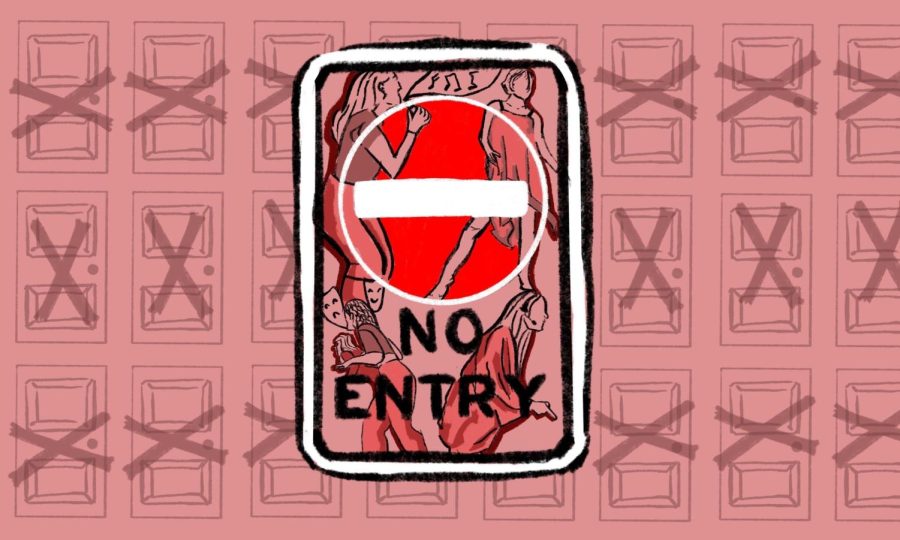The exception to the rule: Northwestern theatre students discuss dealing with rejection
Illustration by Beatrice Villaflor
Learning how to reframe and cope with rejection is important for theatre majors.
November 10, 2022
Communication sophomore Foster Lehman auditioned for his first musical ever in fall 2021. It didn’t go well.
“I have no idea where I am,” Lehman said, recalling his audition. “I’m off-key. And I forgot all the lyrics, so I started making (them) up. I had another song I was going to do, (but) I just decided to call it.”
He thanked everyone in the room for their time, gathered his things and exited the room.
Lehman didn’t get cast after that audition, but he said that experience prompted him to take voice lessons. As a theatre major, that wasn’t the first time he didn’t get the part, nor was it the last.
At Northwestern, the Wirtz Center for the Performing Arts and the Student Theatre Coalition jointly hold auditions, known as generals, once a quarter. Each audition cycle, hundreds of students audition, and many of them do not get cast. The latest cycle ended Sunday, when Winter Cast Lists were released.
Lehman said the atmosphere at the Wirtz Center during generals is a study in contrasts.
“Some of the more experienced actors, they don’t care,” he said. “They understand that they’re walking in there, they’re putting their stuff down and they’re walking out. That’s as far as they can go. Versus all the freshmen, including myself last year, (are) like, ‘Oh my God, this is gonna decide everything.’”
More than one hundred actors auditioned for generals — and spots are limited. McCormick sophomore Nini Bagundo, the director of “Things I Wish I Said Out Loud,” had more than 70 actors audition for her production’s six roles.
Bagundo said when casting a show, narrowing down candidates can be one of the hardest parts. She said she hoped actors didn’t associate their talent or their worth with the audition outcomes, as her decisions often came down to other factors.
“(The auditionees are) so kind and bright, and I would love to have them,” she said. “They’re real, they’re perfect. But they’re just simply not what I’m looking for.”
Rejection may be a regular part of life for theatre majors, but it comes with strong emotion. Studies have shown that rejection activates parts of the brain associated with physical pain and is processed in a similar way.
Communication sophomore Lili Tarnopol auditioned during Winter and Spring Quarters last year and did not get cast in any roles. She said coping with the initial disappointment after rejection was difficult.
“It definitely stings a lot in the beginning,” Tarnopol said. “I don’t think there’s any way we can really control that.”
NU’s audition process includes an abundance of student-run productions, meaning students are frequently casting other students. The theatre program at NU numbers a little less than 400, so candidates often know the people casting them.
Communication sophomore Angelena Browne recalled a time when she hung out with a friend and two hours later was auditioning for them.
“It’s actually very difficult to separate because these are people you hang out with on the weekends and get lunch together,” Browne said. “So you kind of just have to feel separation once you walk into the room.”
Auditioning at NU can include rejection at least once, if not many times in a quarter. But students find ways to cope with rejection, both emotionally and in professional terms.
When Browne wasn’t cast in any shows during general auditions last winter, she started auditioning for student films and smaller productions and was cast in a few. She said those experiences helped her view auditioning itself as a skill.
“I actually spent hours prepping audition material (this quarter),” Browne said. “Because when I didn’t in the past, it wouldn’t work. It is something that you have to practice and prepare for constantly.”
Despite thorough preparation, it’s possible to still not get cast in any roles during an audition cycle, especially because students can typically only perform in one or two shows each quarter.
Lehman said learning to cope with rejection makes theatre majors more resilient, and encourages them to become more confident in their own abilities.
After two quarters without getting cast, Tarnopol auditioned for the freshman musical, Heathers, and landed the leading role. That experience taught her that no matter your current situation, there are always new opportunities, she said.
“Getting cast in the Freshman Musical last year would not have meant nearly as much as it did to me if I had been getting cast before that,” she said. “It wouldn’t be as rewarding as it was if failure wasn’t an option.”
Browne added that though emotions may run high during audition season, it’s because of how much actors care about their parts. She added that after generals ended last week, regardless of whether auditionees were cast, everyone seemed happier.
Lehman said he thinks of auditioning as the true job of a theatre major. What helps him, he said, is remembering that in theatre, getting the part is much rarer than the alternative.
“I get up there, I do my thing. I just did my job. And if anything happens, then that’s amazing,” he said. “And (that’s) the exception to the rule, not the rule.”
Email: [email protected]
Twitter: @MikaEllison23
Related Stories:


